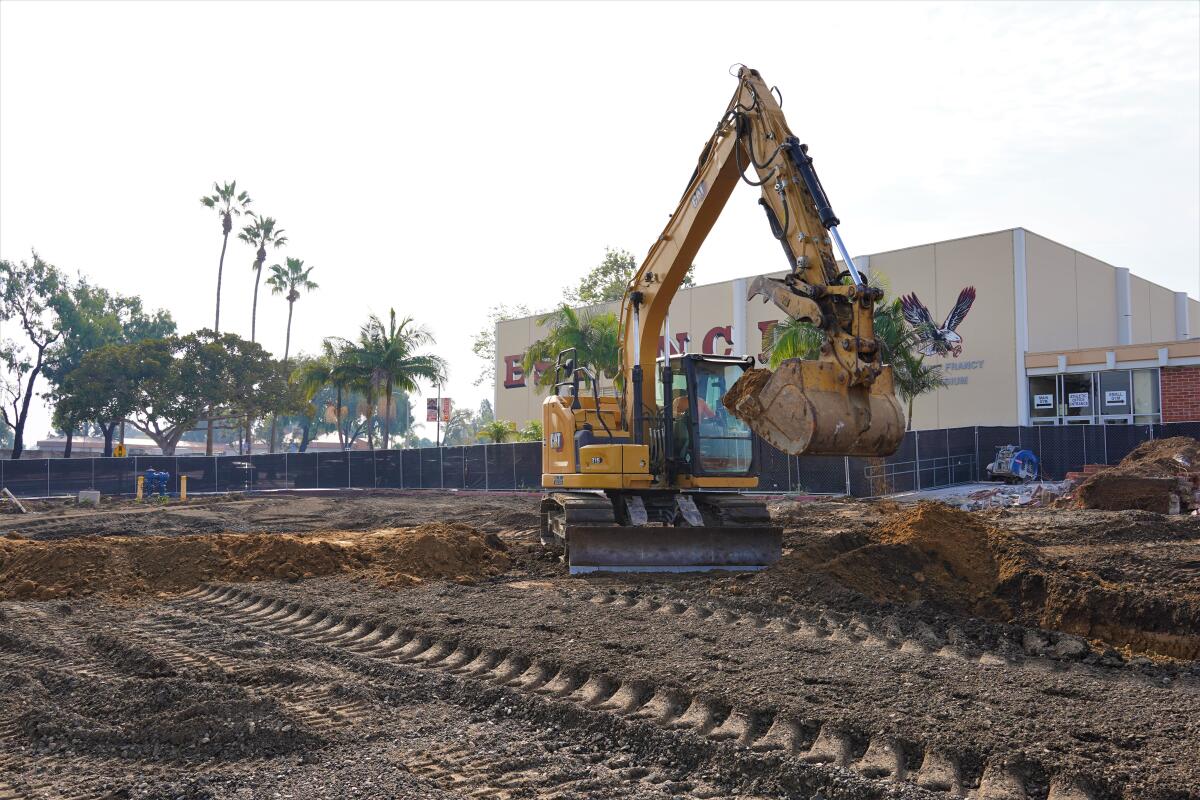Newport-Mesa Unified advised to hold off on seeking bond in November

- Share via
Although Newport-Mesa Unified School District voters care deeply about improving the quality of public school education, a stormy election season forecast for November could dash the district’s hopes of passing a multi-million dollar bond to fund such improvements.
Such an ask could, alternatively, encounter much smoother sailing were a bond to be floated during the 2026 midterm elections and preceded by a period of robust community outreach and engagement.
That was the determination of a bond feasibility survey, designed to gauge the potential support for and opposition to a general obligation bond among citizens likely to vote and considered by board members in a regular meeting Tuesday.
Tim McLarney, owner of Encinitas-based True North Research, shared findings from a weeklong survey of 535 district voters contacted by telephone text and email to determine whether residents would pay up to $24 per $100,000 of assessed property value over the next three decades for various facility and infrastructure improvements across the district.
Initial reactions to the prospect seemed favorable with 56% of respondents — just 1% higher than what would be required for passage — saying they would support such a measure, compared to 31% who said they were not and another 13% who were unsure.
Surveyors asked citizens to rank various issues of importance and found 86% of those with whom they spoke supported improving the quality of public school education. Reducing crime and gang activity ranked second, with 73% of voters responding affirmatively.
When exposed to positive arguments for passing a bond, including explanations for the need of updating old buildings and technology, removing hazardous materials and investing in the future of children, the initial 56% support rose to 62%.
However, third on the list of respondents’ overall civic priorities was preventing local tax increases, a cause that found favor among 69% of voters reached by the survey and spelled a bit of bad news for NMUSD.
“Voter support for a proposal like this can depend on the price tag — the higher the price tag, all things being equal, the less of a level of support you can expect,” McClarney told the board Tuesday. “The moment the conversation focused on the price tag, support was cooling down for this proposal.”
Only 52% of respondents favored a hypothetical bond when they were told they’d be charged $24 per $100,000 of assessed property value. This taxation, if sanctioned, would run concurrent with the district’s Measure F bond, passed in 2005, which does not sunset until 2038 and levies $16.30 per $100,000 of assessed value.
McLarney said another headwind the district could face in November is a current “electoral climate” that could draw a deeply divided populace, with strong feelings about taxation, to the polls on Election Day.
“It’s going to be a bitter, hyper-partisan presidential election that is kind of going to set the tone. That usually creates some challenges for local measures,” he said.
“I frankly wouldn’t feel comfortable recommending that you move forward because it wouldn’t take much adversity for this measure to end up being underwater — I think the better, smarter play is to focus on November 2026.”
Doing so, the consultant added, would give the district more time to communicate key messages about the need for a bond and what could be accomplished. Meanwhile, an independent and privately funded campaign run by volunteers could increase voter turnout and help a bond campaign weather uncertainties.
Assistant Supt. and Chief Business Official Jeff Trader said Thursday board members took no official action at Tuesday’s meeting and have until an Aug. 9 filing deadline to determine whether to seek a bond in November. The board’s last regular meeting before that deadline is set for July 30.
Examining the feasibility of a bond follows the months-long process of creating and adopting a facilities master plan that identified a total of $2.5-billion worth of recommended capital improvements and determined a priority list for funding and completion.
Details of the plan can be found online at nmusdplan.org/chapters/summary.
Updates
1:22 p.m. June 28, 2024: This story has been updated to remove a specific dollar figure attached to a potential bond, as that number has not yet been decided. “...It does not serve as a predetermined target but rather gauges taxpayer support for a bond measure,” according to district officials. A paragraph listing the projects that might be completed with money raised through a new bond has also been removed, as the officials say they do not currently have a specific list of such projects.
All the latest on Orange County from Orange County.
Get our free TimesOC newsletter.
You may occasionally receive promotional content from the Daily Pilot.




